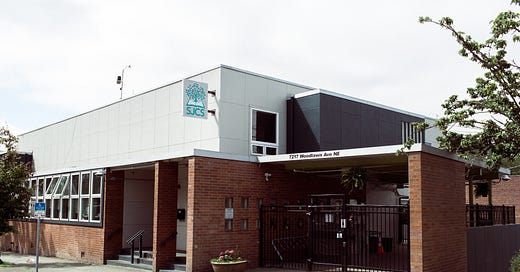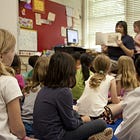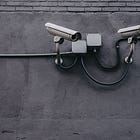As Public Schools Reel, Jewish Day Schools Grow
Tuition incentives and the current climate are driving more families to reconsider their education decisions.
Arlana Angel and her husband, Noam Schafer, had made their decision: This fall, their daughter would start kindergarten at the public school near their home on Beacon Hill. It was a decision they considered deeply and ultimately felt would be right for their family.
In the months following October 7th, however, that decision started to deteriorate. “The nail in the coffin for me was showing up to a public school and seeing a car plastered with ‘stop the genocide’ and ‘free Palestine,’” Angel says. “It’s not that I want a safe space. I just want my kids to develop a strong Jewish identity first.”
Her family decided to enroll at Seattle Jewish Community School (SJCS), a pluralistic school in Green Lake. She’s been thrilled so far. “My daughter loves it. She’s so excited to speak Hebrew words and learn the Hebrew alphabet. They make math fun, they’re outside a lot. A lot of their learning is based on the world around them. Kindergarten is supposed to be a magical time anyway, but they do a really good job of it.”
SJCS has always been a small school, but this year the K-5 institution saw a 17 percent enrollment jump — from 53 children to 62, says head of school David Zimand. “Just as notably, after the first six weeks of the school year, we already had more inquiries and scheduled just as many kindergarten tours as we did in all of last year, a year when we filled our kindergarten.”
This trend mirrors the other Jewish day schools in Greater Seattle. “All the schools are doing amazing,” says Melissa Rivkin, director of day school strategy for the Samis Foundation. “Also, retention has been over 90 percent. It’s the national standard for retention.”
Three years ago, Samis introduced the Day School Affordability (DSA) initiative to subsidize tuition for families making up to $350,000 a year. In September of 2023, enrollment figures showed a 14 percent increase from the prior year and a 26 percent increase from 2021. But affordability is only one piece of the picture.
“For many, the DSA was a primary factor in their enrollment. It lowered the barrier to entry,” says Rivkin. “The draw for Jewish schools for new families was personalized attention and the lingering effects of COVID.” Seventy-five percent of families who switched into Jewish day schools during COVID have stayed, she notes.
Then the attacks of October 7th happened. Prizmah, a network for Jewish day schools across North America, recently came out with telling data: Of parents choosing day school education at this time, 73 percent want their children to be in a Jewish environment, and 68 percent are concerned about anti-Semitism in the broader community. Thirty-nine percent of schools saw more inquiries or enrollment due to the war, and 38 percent of parents with kids in secular private schools are thinking about switching to Jewish day schools. “In the post-October 7th world, day schools become more relevant,” Rivkin says.
According to Rivkin, the biggest feeders into day schools are Jewish preschools and early childhood programs and public schools. Other students move over from secular independent schools, special-needs schools, non-Jewish preschools, out-of-town Jewish schools and secular schools — basically everywhere.
The Bellevue School District, as written about here, has not achieved high marks for handling anti-Jewish activity in its schools. And Seattle Public Schools’ non-stop crisis mode is getting old for many people, too. Last spring SPS announced a plan to close up to 30 schools, which dropped to four before stalling due to outcry. Rebekah Binns, a resident of Seward Park and a parent of children at Graham Hill Elementary School — one of the schools that was on the chopping block and the one that’s in the geographic center of Seward Park’s Orthodox community — is leading the petition to recall SPS board president Liza Rankin.
Binns feels Seattle Public Schools has missed an opportunity to include minority communities. “For our particular school, they should have considered the heavily Orthodox community when considering boundary lines,” she says. “People are living here for the religious community. In a lot of ways Seattle Public Schools does a terrible job of looking at anything beyond major Christian holidays. They’re so blind.”
Angel echoes this frustration. “The first day of school was on Rosh Hashanah a few years ago,” she says. “That doesn’t work for our family.”
It wasn’t always like this. The first generations of Seattle Jews, concentrated in the Central District, attended public schools, like Garfield and Franklin. The Talmud Torah provided extracurricular Jewish education. And life in the Central District kept everyone hemmed in along the seam of Yesler Way. But by the 1960s this community had started to fan out, and the impact of assimilation affected many Jews who left for the suburbs and a more secular life. The idea of a Jewish school is still anathema to many local Jews as well as Israelis who are not fond of religious authority.
“There is a perception that day schools are too particularistic,” says Rivkin. But Zimand doesn’t see SJCS as particularly particularistic. “We all know we’re living in a world where people have lost the capacity to disagree,” he says. Argument and debate are central to Jewish values: “We are carrying forward a very powerful tradition.”
Plus, there’s Seattle, with its inspiring landscape and history of social justice, which factors into the SJCS philosophy. “There is an East Coast conceit that the West Coast is a Jewish desert,” he adds. “There are so many ways in which the West Coast is engaged in creative Jewish life. People are looking for meaning. The West Coast is an opportune place where the market for meaning and connection is present.”
To sweeten the deal even more, SJCS just announced an additional tuition reduction for Jewish communal professionals. “When Jewish communal professionals show they have found a good match for their children in day schools, it’s good for the whole community,” Zimand says.
It’s big ideas like this that could help give day schools the extra edge. “What is the next billion dollar investment in Jewish education?” Rivkin asks. No one was thinking about making medical school free — until someone went ahead and did it, she says. Philanthropists are paying attention. “We already knew the impact of Jewish day schools on long-term Jewish continuity is pretty profound.”
Samis’s goal before October 7th was to double enrollment in five years with initiatives like the DSA. It’s possible that more Jewish families’ appreciation for a nurturing Jewish environment due to the current climate could see that goal met.
“People feel the sense of community, but they also sense that their children are seen and known,” says Zimand. “This is a loving place committed to the best interest of kids, and people sense that.”
Angel agrees. “What is the current environment, and what do we want to give our children?” she asks. “Everything in the world is telling us that it’s a strong Jewish identity.”
Photo: SJCS, courtesy SJCS
Community Announcements
Check out the Seattle Jewish community calendar.
Candlelighting in Seattle is at 4:13 pm. The parasha is Vayera.
Order your 2025 National Mah Jongg League playing card and support Hillel UW! When players join this group order, there's no extra cost and the NMJL will donate a portion of each card to Hillel. Contact Marilyn Corets at mcorets@outlook.com to place an order or to sponsor a Hillel UW student's card. All orders will be mailed directly from the NMJL at the end of March 2025. Hillel UW is a safe home away from home for Jewish students and a great place to learn and play Mah Jongg!
Check out MARQUEE, David Benkof's Broadway-themed Substack for people who want to think more deeply about musical theater.




